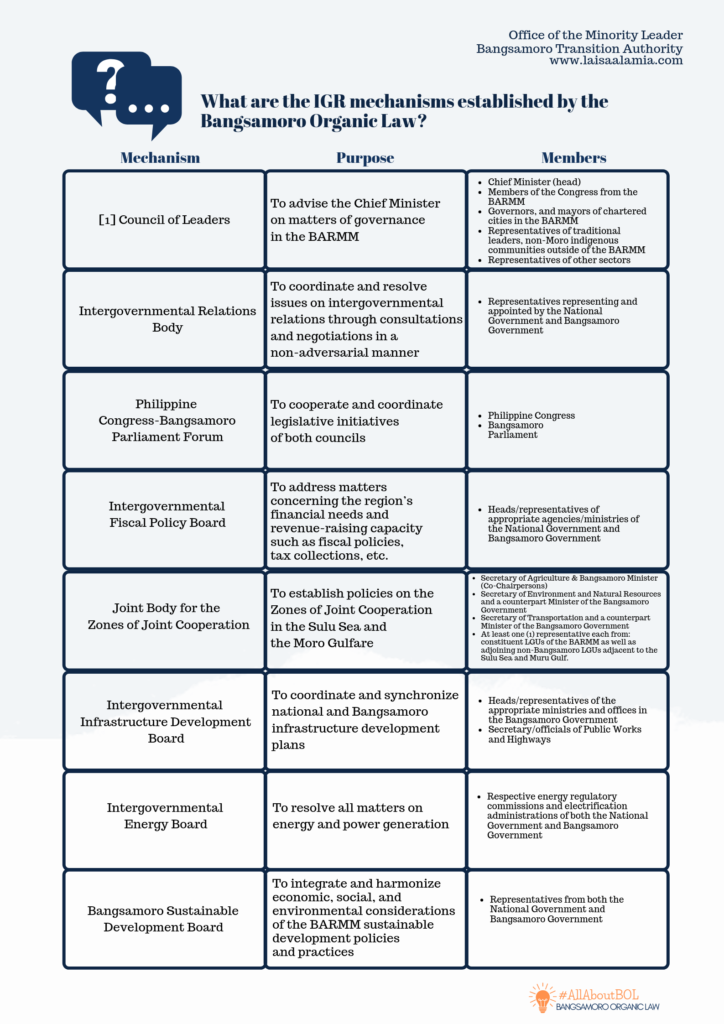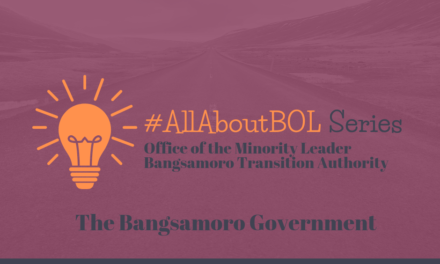How can our regional government work with other levels of governments? Are there platforms for our national, regional, and local governments to come together and discuss policies and governance issues?
The answers to both questions have been laid out in the BOL, thanks to its provisions on Intergovernmental Relations (IGR). IGR is a unique feature of the BOL that sets the processes and institutions through which the Bangsamoro Government, its constituent local government units (LGUs) and the National Government can interact for coordination, regulation, cooperation, and issue resolution.

The main mechanism established by the BOL is the National Government-Bangsamoro Government Intergovernmental Relations Body or Intergovernmental Relations Body (IGR Body), whose members will be appointed by both governments. The IGR Body is primarily tasked to coordinate and resolve issues on intergovernmental relations through consultations and negotiations in non-adversarial manner. The law states that it should exhaust all means to resolve the issues brought before it and that unresolved matters shall be elevated by the Chief Minister to the President, who exercises general supervision over the Bangsamoro Government. The Bangsamoro Government, on the other hand, has also been given the power to create, divide, merge, abolish, or alter boundaries of municipalities or barangays within the BARMM. It also has an authority to regulate the affairs of its constituent LGUs, guaranteed in accordance with the BOL and a Bangsamoro local government code that will be enacted by the Parliament.

The BOL also mandates that the Bangsamoro Government, as far as practicable, shall be represented in national departments, offices, commissions, agencies, and bureaus that implement and enforce the National Government’s policies, programs, and projects in the BARMM. It shall also, to its power, provide supplemental funding for such programs and projects.
Moreover, the National Government is mandated to provide assistance to other Bangsamoro communities outside the BARMM by undertaking programs for their rehabilitation and development. The Bangsamoro Government shall likewise provide assistance in coordination with the appropriate national government agencies and LGUs where these communities are located.
Apart from this, the BOL also identified other IGR mechanisms:
- Philippine Congress-Bangsamoro Parliament Forum to cooperate and coordinate legislative initiatives of both councils;
- Intergovernmental Fiscal Policy Board to address matters concerning the region’s financial needs and revenue-raising capacity such as fiscal policies, tax collections, etc.;
- Joint Body for the Zones of Joint Cooperation to establish policies on the Zones of Joint Cooperation in the Sulu Sea and the Moro Gulfare;
- Intergovernmental Infrastructure Development Board to coordinate and synchronize national and Bangsamoro infrastructure development plans;
- Intergovernmental Energy Board to resolve all matters on energy and power generation;
- Bangsamoro Sustainable Development Board to integrate and harmonize economic, social, and environmental considerations of the BARMM sustainable development policies and practices; and
- Council of Leaders to advise the Chief Minister on matters of governance in the BARMM.

This article forms part of the #AllABoutBOL Series published by the Office of the Minority Leader – BTA as an effort to explain and raise awareness on the Bangsamoro Organic Law (Republic Act No. 11054). For questions or comments on the Series, contact us through this link.







